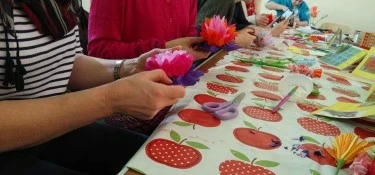
Published on 4th April 2019
The Power of Community
This week we thought, what better way to kick start the week, than celebrating our fantastic grassroots community groups here in Norwich. So I met up with Craft n Laugh organiser Emma Carrgilson to see how she goes the extra mile supporting residents and building community in Mile Cross.
Craft n Laugh, Emma explains is simply crafty and like-minded people sharing ideas and skills, to positively impact on the community and invest in people.

Visiting the session it’s easy to see why Craft n Laugh is such a local success. Emma’s people skills put anyone at ease, particularly as her laughter bubbles over. But it’s the sense of friendship and support that really makes the group stand out and brings people to her weekly morning sessions.
Emma’s involvement started when she felt a sense of community missing in Mile Cross. Keen to play a part of bringing people together, she was empowered and supported by The King’s Venue to get involved. Through this support Emma learned to use and share her passion for crafting with others. And gaining the confidence to do something to make a real difference, she’s not looked back since.
With help from a small grant from Norwich City Council, now known as a ‘Get Started’ grant, Emma had the chance to test her ideas with the community. And she’s the first to admit her expectations with Craft n Laugh have been far exceeded.
“I am so proud of how far we have come, and excited by our prospects of going further. Each week we deliver crafts on a low budget and provide a place to come and learn, but we’re also a place where people can be supported to cope with the challenges that life chucks at us. We’ve even added evening classes once a month which are proving extremely popular and really valuable in bringing together people with additional skills to share.”
“Some days we do more laughing than crafting!”
Their vision is simple, to continue to grow and reach new people. “Everyone can craft and learn new skills. But even if you don’t feel like crafting, just come and sit and chat, and that’s absolutely fine.
“What’s important is people feel supported and that’s what we do best!”

Advice to new groups
I asked Emma what advice she’d give to someone thinking of starting their own group.
Step 1: Plan, plan, plan! Best advice ever! We did plan at the start, but found along the way we were growing at a great rate. We needed to change a few things to ensure everyone felt valued and respected and enough time was allocated for projects. While we had to make changes as we went, it was better to start with a plan and tweak it, than have no plan at all.
Step 2: Make sure you have your support in place. For me it was important to think about things like who would run the group if your kids are ill? Having another key person in your group who’s just as passionate about your idea as you is really helpful. Sometimes it might take a little while to build their confidence, if so try breaking it down into different roles or giving small tasks first and build on that. If you are really struggling look at recruiting more volunteers. Voluntary Norfolk can help with that or you could try asking at another local groups: www.voluntarynorfolk.org.uk/volunteering/volunteer-recruitment
Step 3: Do your research. Find out what’s needed in the community? Are there similar groups already in the area? Make sure you’re not wasting your efforts by just duplicating things. If there’s a group already running in your community, you can always increase the benefit to the community by running on a different day so there’s even more choice and impact for community.
Step 4: Get all the practical bits and pieces in place before you start. I can’t emphasise that enough! When applying for grants, funders will be looking to see what policies you have in place. Getting things like this and your constitution written first is well worth the time and effort. Plus the process helped us work out how we make those important decisions, like members fees or how we should protect our members. We got help from Norwich City Council but there’s plenty other information out there to help, like here on LUMi!
Step 5: You’ll need a start-up kitty. Applying for something like Norwich City Council’s Get Started grant will help you get going. It’s not just about getting funding, it’s about making it right for the community but you will need some cash to help cover initial costs. If you can, it really helps to have a contingency fund to tap into. Particularly in the early days when numbers are still growing but you still need to pay the room hire fees, then just regenerate the pot when you can. For us, that’s our evening sessions, these help to bring in a little more cash which sustains the group and brings me a welcomed peace of mind!
Remember, each group is different - I would definitely say that the passion you start with should be consistent throughout, and never stop setting goals to reach and surpass, you can do it!
If Emma has inspired you to try starting your own group, you too can access support from Norwich City Council to help get you started in LUMi's Skills section.
Don’t forget to sign up to our fortnightly e-digest to keep up to date with all the great new shares that are being added to LUMi.